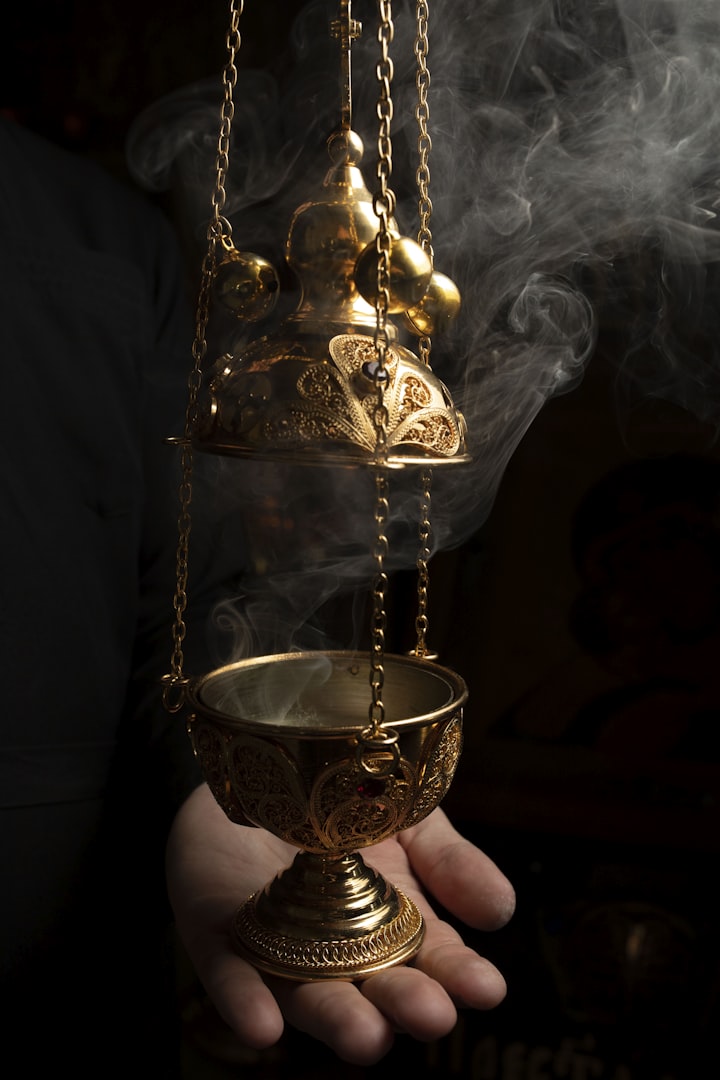Poetry is My Religion
Discovering The Art of Saying the Unsayable

“Poetry is eternal graffiti written in the heart of everyone.” - Lawrence Ferlinghetti
“The poet is the priest of the invisible.” - Wallace Stevens
As a child I always loved reading. An introvert to the core, all day I’d wait until school was over just so I could go home and lose myself in a book. The most tragic event in my early childhood was when one of the teachers told me I couldn’t sit and read during recess.
When you take a lot of food in, it inevitably comes out the other end (hey, everyone poops), so of course I began to write early too. Fictional stories were my first love, as they were my soul’s first nourishment as a loner kid. They became equal parts sustenance and escapism for me to read, and an outlet for me to write, as a selectively mute, anxious child who didn’t feel comfortable putting my thoughts and imaginings out in speech. But if you had told me at 10, 14, or even 18 that I’d be writing this article about poetry, I wouldn’t have believed you.

My first experience with reading poetry was, as I think it is for most people, filtered through the lens of a public school education. Then, it seemed inaccessible, something we had to peel apart and analyze. A lot of what we studied was so formal and it wasn’t at all fun. Because a lot of what we read was in outdated or complex language, poems always felt to me like riddles I had to sit and decipher, a complicated question for which there was only one answer and I wasn’t allowed any hints. It made me feel dense and frustrated.
This isn’t to say that classical or form-bound poetry is bad. It’s just that the way I was schooled to digest it was…unappetizing.
If only I had known all I had to do was feel.

“It was at that age, that poetry came in search of me.” - Pablo Neruda
“Poetry is an echo, asking a shadow to dance.” - Carl Sandburg
Over the summer after graduating high school, I bought my first poetry book. I had followed author Jaida Jones online and fell in love with their at-the-time famous fan fiction. From there, I had to support everything they came out with in life; after all, they were living the OMG-ACTUALLY PUBLISHED dream and I was so inspired by them. So when I discovered Cinquefoil existed, I bought it more out of duty than anything else.
Reading it was unlike any of the limited experiences I’d had with poetry up until then.
First of all, the language was completely accessible and most poems followed no form or rhyme scheme. It was like the most beautiful, incisive thoughts of the private mind had been turned inside out and spilled over a page. It was colloquial in tone and often funny and relatable; at the same time, each grouping of ordinary English words took on its own unique power as if somehow they outlined something with a previously indefinable shape.
One of the first surprising thoughts I had, as I became so hungrily engrossed in its pages, was how deeply some of it resonated with me, how familiar it sounded. My own brain sometimes wrote poetry without knowing it.

“To be a poet is a condition, not a profession.” - Robert Graves
The deepest, most life-changing realization I had about poetry was that I didn’t have to know what it meant to enjoy it. Trying to decipher the author’s intent and why when a few words were arranged a certain way they evoked a certain feeling wasn’t initially important to me. It was only important that the feeling existed. The poetry had done its job. That’s when I began to think: I can do this.
After that, I was changed; a transformation had taken place. I started noticing that sometimes my thoughts, already primed for both introspection and storytelling, were naturally spitting out bits of poetics.
I would stay awake nights with a spiral notebook next to me and ‘catch’ everything that floated out to me.
And that’s really how it felt- floating out. Like there were words everywhere, phrases like ghosts in the air that some days you just happen to walk through. I found that if I didn’t get it down quick, it would go away.
I’ve now been in the habit of writing poetry for almost fifteen years, and in this time I have developed an almost ritualistic devotion to it.

“A poet is, before anything else, a person who is passionately in love with language.” - W.H. Auden
Reading and writing poetry go very well together in the same space for me. The reading of other’s work is like a catalyst to wake up my insides and get them warmed up, playing around, and feeling all there is to be felt.
Very often my poems can be inspired by reading other peoples’ poetry. Often the feeling a poem gave me, my own emotional reaction to someone else’s words, leads me into a pocket of potency in myself and I’m able to churn out something completely original as a result. I start a lot of my poetry writing days this way, because often out of this sustained period of reading, I feel it coming up in me too, the urge to spill over onto paper all the unique feelings I’ve had evoked in me by one person’s unique rendering of their own thoughts and feelings at one space in time.
Because of this feeling of being time-bound and gifted with the scraps I was catching out on the air, much of my poetry writing, unlike with novels, is done in old fashioned pen and paper. It’s incredibly messy and sometimes out of order.
When I’m done with it, I simply stop and don’t look at it again until at least a day later. I like to let my poetry steep in its raw form before I move to the next step- typing it up and editing it.

“Poetry is ordinary language raised to the Nth power. Poetry is boned with ideas, nerved and blooded with emotions, all held together by the delicate, tough skin of words.” — Paul Engle
The amount of editing I have to do depends on the poem, but I have a system by now. I usually take out my scribbled-on notes and begin to dictate them onto my computer. I like to use dictation because it helps me to hear the poetry out loud, modulate its flow, and know where to add punctuation as well as lines and stanza breaks. Then I’ll read it over silently this time, and go through and make some formatting changes and edits as I see fit. This can be very quick - sometimes the poetry comes out almost exactly in its final form- and other times it’s a long convoluted process where I’ll discover that I don’t like the poem I wrote but a whole new one will come out of the writing I do have.
Working with the language is fascinating. In nowhere but poetry does it matter so crucially where a single word is placed. The first line is so important to me, as is the last. Sometimes challenging yourself and doing something completely different- like switching the first and last line around- can lead to a revelation or give the poem a whole different feel. one word can mean so much- just the placement, the inflection the punctuation, can either make it inconsequential, a mere bridge, or give it all the meaning in the world.
And it has to be said: though i’m not as big a fan of formal poetry as free verse I’ve really enjoyed writing it from time to time. There’s a paradoxical freedom offered in structure: you have a set of rules to play within, and in some ways it helps you to be more creative and bold, to see just what you can do with what you’re given. Poetry has given me a love of language beyond its literal meaning, and it’s also helped me get so much more in touch with my intuition.

“I have never started a poem whose end I knew. Writing a poem is discovering.” - Robert Frost
“I’ve written some poetry I don’t understand myself.” - Carl Sandburg
My job isn’t initially to understand the words I’ve been given; it’s just to feel them, then put them on paper in their raw form before they get away from me.
Not only has poetry made me more in touch with my own intuition, but it has led to me making discoveries about myself. About my own inner landscape, the intricacies of that terrain; explanations for why I feel the way I feel, why certain images just stick in my head, leaving a profound imprint.
Sometimes, a poem ends somewhere unexpected for me. Sometimes, it’s only looking back at what I’ve written that I understand what I was feeling or trying to say.
And ever so occasionally, this happens YEARS after I’ve written the original piece.
The most surreal poetry-writing experience I ever had was back in 2009. I woke up in the middle of the night with words hammering at the insides of my skull. I took up a pen and paper and wrote them down so fast, and through such sleep-bleary eyes that they could have been absolute nonsense for all I knew. I just had to get them out. Right afterward, I promptly fell back to sleep.
The next morning, I had all but forgotten I’d even written a poem in the middle of the night. When I went back and made sense of my scribblings, I was struck by the fact that this was one of my favorite poems I’d ever written. It evokes a strong emotion in me I couldn’t name for years but which felt very central to who I am. It was only five years later that I realized this poem was my first attempt to describe being a nonbinary person (at the time of writing that poem, I hadn’t even known that word). My subconscious, dreaming mind knew what needed to be said, even if my conscious mind didn’t know what I was saying at the time.

“To read a poem is to hear it with our eyes; to hear it is to see it with our ears.” - Octavio Paz
One of my favorite things about poetry is how it can stretch across mediums.
Spoken word poetry is very like music, or even theatre. Some poems are MADE to be read aloud, where others lose something in their verbalization and sit best on the page, an intimate communion between the reader and the words.
Poetry can also be visual art. I remember being so delighted when I discovered the art of “black out” poetry. I could take a page from a newspaper, a book or a magazine and create poems by blacking out all but a handful of select words.
This falls under the category of what is called ‘found’ poetry. I love how it allows me to play with designs while giving me a set amount of words to play with and turn into something new.
Like with formal poetry, found poetry has you working within a structure; but then all poetry is working within a structure. The language is the structure we are limited by in trying to express things that go beyond words.

“Poetry doesn’t belong to those who write it, but those who need it.” - Pablo Neruda
I tend not to like to talk too much about what my poetry ‘means.’ Even when I do, I make it clear that it’s only what the poem meant for me, what I was going through when I wrote it, and nothing more.
Origin stories can be really interesting, but I can still remember times in the past when I’ve gotten really attached to a particular song on the radio. This song gains a really special, private meaning for me, only to one day have someone I know say “No, that’s not what that song means at all. The artist was writing about drugs/a relationship/etc instead.” In a sense this felt like my connection with the song had been cheapened or invalidated. It was only once I started writing poetry that I realized how true this quote by Katherine Paterson is:
Once a book is published, it no longer belongs to me. My creative task is done. The work now belongs to the creative mind of my readers. I had my turn to make of it what I could; now it is their turn. -Katherine Paterson, A Sense of Wonder: On Reading and Writing Books for Children
This goes back to my formal education a little, but I one hundred percent rebel against the idea that a poem has only one right answer or meaning. The magic of poetry and other art is that it is constantly being interpreted through each person is like a lense the poetry is refracted through, and because no two people are the same, and even the same person is constantly growing and changing, your poem will come out in a different light and at a different angle of meaning each time it is read. Truly great poetry transcends one objective meaning, and that’s POWERFUL stuff.
And isn’t one of the best things about being an author to hear what other people got out of your own work? People who’ve read my poetry have shared what it meant to them, and suddenly I love the poem even more for it’s ability to say things I didn’t even realize it was saying. Others’ interpretations are not only a gift to them but a gift to me. I’ve had people tell me what my poetry meant to them, how it made them feel, and sometimes this disclosure changes the way I think about my own poem. Sometimes another person will even hit on something I never saw before in the poem, and open the door for me to understand what the hell I was actually writing about if before there’d been some confusion.
Again, the art transcends the artist so how could it possibly belong just to us? It’s in times like these that I feel most like a channel, a conduit of some sort through which this liquid type of magic can flow.

“Poetry is the liquid voice that can wear through stone”- Adrienne Rich
“It is a test that genuine poetry can communicate before it is understood.” - T.S. Eliot
I’ve developed a sort of ritual around poetry. In the mornings, I like to make myself a fresh pot of coffee and put a stick of incense in to burn. I’ll then pick up whatever collection I am currently reading and get lost in the words and imagery.
Sometimes I have to put the book down and just feel, bathe in a part of the poem before continuing. What comes in must come out, and in this sacred time is usually when I put pen to paper and write my own poetry as well. The feeling of channeling something and just trusting the process is both scary and exciting; it has opened me up to the most I’ve ever felt, whether that feeling is sadness, love, or revelation.
It feels, in a very real way, like I’ve arranged this hallowed space to conduct a form of magic. I’m not a religious person, but poetry is the most deeply spiritual thing I’ve ever done in my life.
I am certain that if souls exist, then this is the way they touch.
{thank you so much for reading! It would mean so much to me if you could drop a heart below :D. Tips are appreciated but of course not necessary! Until next time, keep doing whatever it is that lights up your insides xx Raist}






Comments
There are no comments for this story
Be the first to respond and start the conversation.